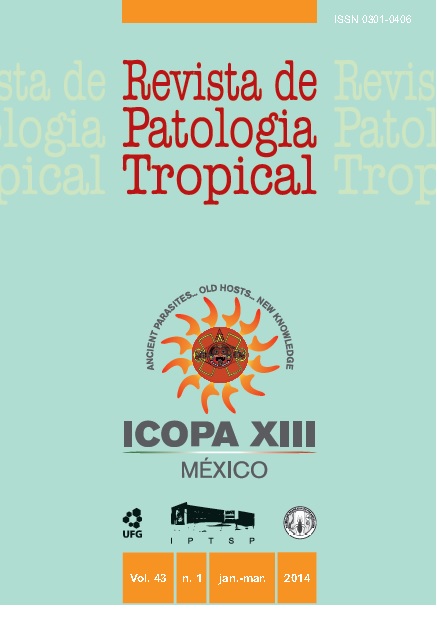FACTORS ASSOCIATED WITH THE OCCURRENCE OF INTESTINAL PARASITES IN CHILDREN LIVING IN THE FEDERAL DISTRICT OF BRAZIL
DOI:
https://doi.org/10.5216/rpt.v43i1.29374Keywords:
Intestinal parasites, children, socioeconomic factors, Federal DistrictAbstract
This study aimed to describe factors associated with the occurrence of intestinal parasites in children living in the Federal District of Brazil (FD). Between 2012 and 2013 fecal samples from 193 children of Riacho Fundo II (RF, n=73) and Ceilândia (CE, n=120) were examined using Rugai and Lutz’s methods. Socioeconomic and health variables were obtained through interviews with the children’s parents. The association between these variables and the occurrence of parasites was analyzed bychi-squared or Fisher’s exact tests. The occurrence of parasites in RF (79%) was higher than in CE (54%). The most frequent parasites were Giardia intestinalis (RF=15%, CE=9%), Hymenolepis nana (RF=44%, CE=0%) and Ascaris lumbricoides (RF=30%, CE=2%). In CE, a higher frequency of parasites was found in children living in crowded houses and also in houses with domestic animals present. In RF, a higher frequency of parasites was found in children whose families did not wash fruit and vegetables hygienically. A relevant occurrence of intestinal parasites in children was found in the FD, where there is a treated water supply and sewage system. We concluded that poor hygiene habits are the key factors in the transmission of intestinal parasites in FD.
Downloads
Downloads
Published
How to Cite
Issue
Section
License
The manuscript submission must be accompanied by a letter signed by all authors stating the full name and email address, confirming that the material has not been published or is under consideration for publication elsewhere, and agreeing to transfer copyright in all media and formats for Journal of Tropical Pathology. The authors will not be paid for published articles. They are solely responsible for the content of those articles, even if the Editor holds the right to adjust them to the norms of the journal.
The reviewers will not be paid for the peer review process.

